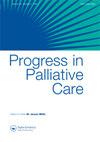医生为癌症患者提供姑息治疗的不和谐信念与实践
IF 0.8
Q4 PUBLIC, ENVIRONMENTAL & OCCUPATIONAL HEALTH
引用次数: 0
摘要
目的我们旨在检查医生在将癌症患者转诊到PC团队的时间方面的信念和实践之间的一致性。方法回顾三年来癌症在姑息治疗室(PCU)的死亡记录。开始转诊到PC的医生完成了一份问卷调查。转诊时间分为早期(>90天)、中期(31-90天)或晚期(≤30天)。结果208例癌症死亡(63%为女性)的中位年龄为55岁。中位转诊时间为33天。只有9.6%的患者被早期转诊,而大多数患者要么被延迟转诊(47.1%),要么属于中间类(43.3%)。所有转诊医生都认为PC服务在肿瘤中心至关重要,73.7%的医生认为癌症患者应在诊断时或癌症无法治愈时转诊到PC。没有患者或医生相关因素与转诊时间显著相关。结论尽管这组医生一致认为癌症患者应在诊断为可治愈时或之前转诊PC,但早期转诊PC的情况非常罕见。信仰和实践之间如此明显的不一致值得进一步调查。本文章由计算机程序翻译,如有差异,请以英文原文为准。
Discordant Beliefs and Practices of Physicians Referring Cancer Patients to Palliative Care
Objectives We aimed to examine the concordance between beliefs and practices of physicians regarding the timing of referring cancer patients to a PC team. Methods We reviewed records of cancer deaths in a palliative care unit (PCU) over three years. Physicians who initiated the referral to PC completed a questionnaire. The referral time was categorized into early (> 90 days), intermediate (31–90 days) or late (≤ 30 days). Results For 208 cancer deaths (63% females), the median age was 55 years. The median referral time was 33 days. Only 9.6% of patients were referred early, while the majority were either referred late (47.1%) or fell in the intermediate category (43.3%). All of the referring physicians believed that a PC service is essential in an oncology center and 73.7% stated that cancer patients should be referred to PC at diagnosis or when cancer becomes incurable. No patient- or physician-related factors were significantly associated with the referral time. Conclusions Despite the unanimous belief among this group of physicians that cancer patients should be referred to PC at or before diagnosing its incurability, initiation of early referrals to PC was remarkably rare. Such a striking discordance between beliefs and practices merits further investigation.
求助全文
通过发布文献求助,成功后即可免费获取论文全文。
去求助
来源期刊

PROGRESS IN PALLIATIVE CARE
PUBLIC, ENVIRONMENTAL & OCCUPATIONAL HEALTH-
CiteScore
2.60
自引率
11.80%
发文量
24
期刊介绍:
Progress in Palliative Care is a peer reviewed, multidisciplinary journal with an international perspective. It provides a central point of reference for all members of the palliative care community: medical consultants, nurses, hospital support teams, home care teams, hospice directors and administrators, pain centre staff, social workers, chaplains, counsellors, information staff, paramedical staff and self-help groups. The emphasis of the journal is on the rapid exchange of information amongst those working in palliative care. Progress in Palliative Care embraces all aspects of the management of the problems of end-stage disease.
 求助内容:
求助内容: 应助结果提醒方式:
应助结果提醒方式:


